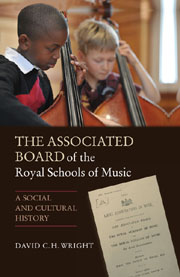Book contents
- Frontmatter
- Contents
- List of Illustrations
- List of Tables
- Dedication
- Preface
- List of Abbreviations
- Miscellaneous Conventions
- Introduction: The Context for a History
- I THE BACKGROUND
- II THE BOARD ESTABLISHED, 1889–1920
- 3 The ABRSM Idea and the First Exams, 1889–91
- 4 The Early History, 1892–1920
- 5 The ABRSM and the ‘British World’
- III THE INSTITUTIONAL CULTURE, 1920–83
- IV THE BOARD REVIVED, 1983–2009
- Appendix 1 Speech and Drama Examinations
- Appendix 2 ABRSM Personalia, 1889–2010
- Select Bibliography
- Index
3 - The ABRSM Idea and the First Exams, 1889–91
from II - THE BOARD ESTABLISHED, 1889–1920
Published online by Cambridge University Press: 05 July 2013
- Frontmatter
- Contents
- List of Illustrations
- List of Tables
- Dedication
- Preface
- List of Abbreviations
- Miscellaneous Conventions
- Introduction: The Context for a History
- I THE BACKGROUND
- II THE BOARD ESTABLISHED, 1889–1920
- 3 The ABRSM Idea and the First Exams, 1889–91
- 4 The Early History, 1892–1920
- 5 The ABRSM and the ‘British World’
- III THE INSTITUTIONAL CULTURE, 1920–83
- IV THE BOARD REVIVED, 1983–2009
- Appendix 1 Speech and Drama Examinations
- Appendix 2 ABRSM Personalia, 1889–2010
- Select Bibliography
- Index
Summary
Setting up the Board: the exams in 1890 and 1891
ON 3 May 1889, six years after the founding of the Royal College of Music, its Director, Sir George Grove, was visited by Alexander Mackenzie, the newly appointed Principal of the Royal Academy of Music, and Thomas Threlfall, Chairman of the Academy's Board of Directors. It had been agreed beforehand that this informal meeting should also be confidential, which is understandable, given the controversial subject the Academy team wished to raise, and the very uneasy relations that existed between the RAM and the RCM. Mackenzie and Threlfall first referred to the rumour that the RCM were contemplating setting up their own extramural exam scheme, and then revealed the purpose of their visit, which was to propose that the two royal British music schools should bury their differences and combine to form a joint music examination board. Grove reported this meeting to the RCM's Finance and Executive Committee and secured their support to explore the idea further It took less than a year for the Associated Board of the Royal Schools of Music to be formally constituted and conduct its first exams at forty-two centres across the country. Despite very little warning and the very substantial two-guinea entry fee, these exams attracted 1,143 entries. That so many entered says much about the contemporary British enthusiasm for taking music exams, as well as about the assurance, and perhaps cachet, of exams conducted by an associated board of the two royal music schools. in 2010.
- Type
- Chapter
- Information
- The Associated Board of the Royal Schools of MusicA Social and Cultural History, pp. 63 - 75Publisher: Boydell & BrewerPrint publication year: 2013



